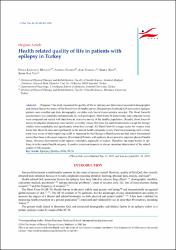| dc.contributor.author | Mutluay Karantay, Fatma | |
| dc.contributor.author | Gündüz, Ayşegül | |
| dc.contributor.author | Tekeoğlu, Anıl | |
| dc.contributor.author | Oğuz, Semra | |
| dc.contributor.author | Yeni, Seher Naz | |
| dc.date.accessioned | 10.07.201910:49:13 | |
| dc.date.accessioned | 2019-07-10T20:01:28Z | |
| dc.date.available | 10.07.201910:49:13 | |
| dc.date.available | 2019-07-10T20:01:28Z | |
| dc.date.issued | 2016 | en_US |
| dc.identifier.citation | Mutluay Karantay, F., Gündüz, A., Tekeoğlu, A., Oğuz, S. ve Yeni, S. N. (2016). Health related quality of life in patients with epilepsy in Turkey. Journal Of Physical Therapy Science, 28(1), 240-245. https://dx.doi.org/10.1589/jpts.28.240 | en_US |
| dc.identifier.issn | 0915-5287 | |
| dc.identifier.issn | 2187-5626 | |
| dc.identifier.uri | https://dx.doi.org/10.1589/jpts.28.240 | |
| dc.identifier.uri | https://hdl.handle.net/20.500.12511/3286 | |
| dc.description | WOS: 000371237800048 | en_US |
| dc.description | PubMed ID: 26957766 | en_US |
| dc.description.abstract | [Purpose] This study measured the quality of life in epilepsy and determined associated demographic and clinical factors by means of the Short Form-36 health survey. [Subjects and Methods] 124 consecutive epilepsy patients were enrolled and their demographic variables and clinical characteristics recorded. The Short Form-36 questionnaire was completed independently by each participant. Short Form-36 dimensional and composite scores were computed and scaled with data from an extensive survey of the healthy population. [Results] Short Form-36 scores for physical dimensions were similar to healthy values, but those for mental dimensions except for energy/vitality were remarkably and significantly lower than normal. All Short Form-36 average scores for women were lower than those for men and significantly so for mental health composite scores. Patients responding well to treatment were aware of their improving health as measured by the Change in Health score and had better dimensional scores than those with a poor response. [Conclusion] Patients with epilepsy do not perceive impaired physical health status. However, their mental health appears vulnerable, especially in women. Therefore, the major burden in epilepsy is in the mental health category. A positive treatment response is also an important determinant of the related quality of life measure. | en_US |
| dc.language.iso | eng | en_US |
| dc.publisher | Soc Physical Therapy Science | en_US |
| dc.rights | info:eu-repo/semantics/openAccess | en_US |
| dc.rights | Attribution-NonCommercial-NoDerivs 3.0 Unported | * |
| dc.rights.uri | https://creativecommons.org/licenses/by-nc-nd/3.0/ | * |
| dc.subject | Epilepsy | en_US |
| dc.subject | Quality of Life | en_US |
| dc.subject | SF-36 | en_US |
| dc.title | Health related quality of life in patients with epilepsy in Turkey | en_US |
| dc.type | article | en_US |
| dc.relation.ispartof | Journal Of Physical Therapy Science | en_US |
| dc.department | İstanbul Medipol Üniversitesi, Sağlık Bilimleri Fakültesi, Fizyoterapi ve Rehabilitasyon Bölümü | en_US |
| dc.authorid | 0000-0003-1432-0913 | en_US |
| dc.identifier.volume | 28 | en_US |
| dc.identifier.issue | 1 | en_US |
| dc.identifier.startpage | 240 | en_US |
| dc.identifier.endpage | 245 | en_US |
| dc.relation.publicationcategory | Makale - Uluslararası Hakemli Dergi - Kurum Öğretim Elemanı | en_US |
| dc.identifier.doi | 10.1589/jpts.28.240 | en_US |
| dc.identifier.wosquality | Q4 | en_US |
| dc.identifier.scopusquality | Q2 | en_US |



















